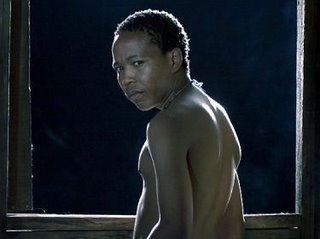I have returned from a delightful vacation up north, and a package from Amazon was waiting for me when I got back. It contained one copy of Beowulf, one copy of the African Bible Commentary (which I hope will give me a fresh perspective on familiar texts), and one copy of Tsotsi, the 2005 Oscar winner for best foreign-language film.
 Tsotsi, a South African film, tells a stirring story of redemption. The title character, whose nickname simply means "thug", begins the film by masterminding and participating in a robbery-turned-murder on a crowded subway, viciously beating one of his cronies for getting on his nerves and stealing a car after shooting its owner. He is vicious, seemingly capable of any kind of cruelty. Presley Chweneyagae, the 22 year old Soweto native, is incredible as Tsotsi, infusing his character with an air of constant menace.
Tsotsi, a South African film, tells a stirring story of redemption. The title character, whose nickname simply means "thug", begins the film by masterminding and participating in a robbery-turned-murder on a crowded subway, viciously beating one of his cronies for getting on his nerves and stealing a car after shooting its owner. He is vicious, seemingly capable of any kind of cruelty. Presley Chweneyagae, the 22 year old Soweto native, is incredible as Tsotsi, infusing his character with an air of constant menace.Tsotsi's life begins to change when he realizes that there is a baby in the backseat of the car he has stolen. He takes the child to his shack, perhaps unwilling to let it suffer the same abandonment we learn he faced as a child. Gradually, and believably, Tsotsi's cold violence is softened as he begins to care for the child. He is not turned into the perfect father, or a choirboy, but rather into more of a human being capable of kindness, of love and of being loved and one willing to face the consequences of his actions.
 The ending of the film is perfect. It does not give Tsotsi an unfair easy escape from his past, and yet it shows real hope for his future. The final image is of the young man with his arms raised above his head. It is a pose of surrender, yet it struck me more as a posture of prayer, of reaching heavenwards to God, the sort of thing one often sees at worship during an especially powerful song.
The ending of the film is perfect. It does not give Tsotsi an unfair easy escape from his past, and yet it shows real hope for his future. The final image is of the young man with his arms raised above his head. It is a pose of surrender, yet it struck me more as a posture of prayer, of reaching heavenwards to God, the sort of thing one often sees at worship during an especially powerful song.Presley Chweneyagae, as mentioned, gives a great performance which makes the transformation of his character into reality. It is not an easy role, growing from psychopath to sympathetic, and he pulls it off spectacularly. Equally strong is Terry Pheto as Miriam, a young widowed mother whom Tsotsi coerces, at gunpoint, into breast-feeding the baby. She brings a real wisdom and strength to the role.
Zola also deserves mention. He plays a minor role in the film, but also provides most of the soundtrack. His music, South African hip-hop in style, is energetic, loud and angry. It gives the audience a small taste of African slum life.
A lot of gangster films of the last number of years have been exercises in style. Thanks to the work of Tarantino (Pulp Fiction), Guy Ritchie (Snatch), and Fernando Meirelles (City of God), among others, the genre has been given a certain, hyper edited look: lots of camera effects and movement, quick cuts, striking angles, etc. Tsotsi, if anything, is oppositely underdirected. The camera does not add flair, it is simply the observer.
 I am a big fan of stylish films. Yet, I think Tsotsi's simplicity is more appropriate to the subject matter than the flashy work of Meirelles. City of God makes being a criminal look good. The audience is horrified by the violence, but can't help thinking that being a gangster must be exciting. It romanticizes a despicable lifestyle. As Walter Chaw writes in his review, "...City of God makes a mistake in making human misery exhilarating--an invitation to rubberneck un-tempered by social responsibility."
I am a big fan of stylish films. Yet, I think Tsotsi's simplicity is more appropriate to the subject matter than the flashy work of Meirelles. City of God makes being a criminal look good. The audience is horrified by the violence, but can't help thinking that being a gangster must be exciting. It romanticizes a despicable lifestyle. As Walter Chaw writes in his review, "...City of God makes a mistake in making human misery exhilarating--an invitation to rubberneck un-tempered by social responsibility."In Tsotsi, the desperation, the fear and the misery of the criminal life is not hidden by fancy camera work. It means a more relevant film, and adds meaning and weight to the eventual redemption.

No comments:
Post a Comment